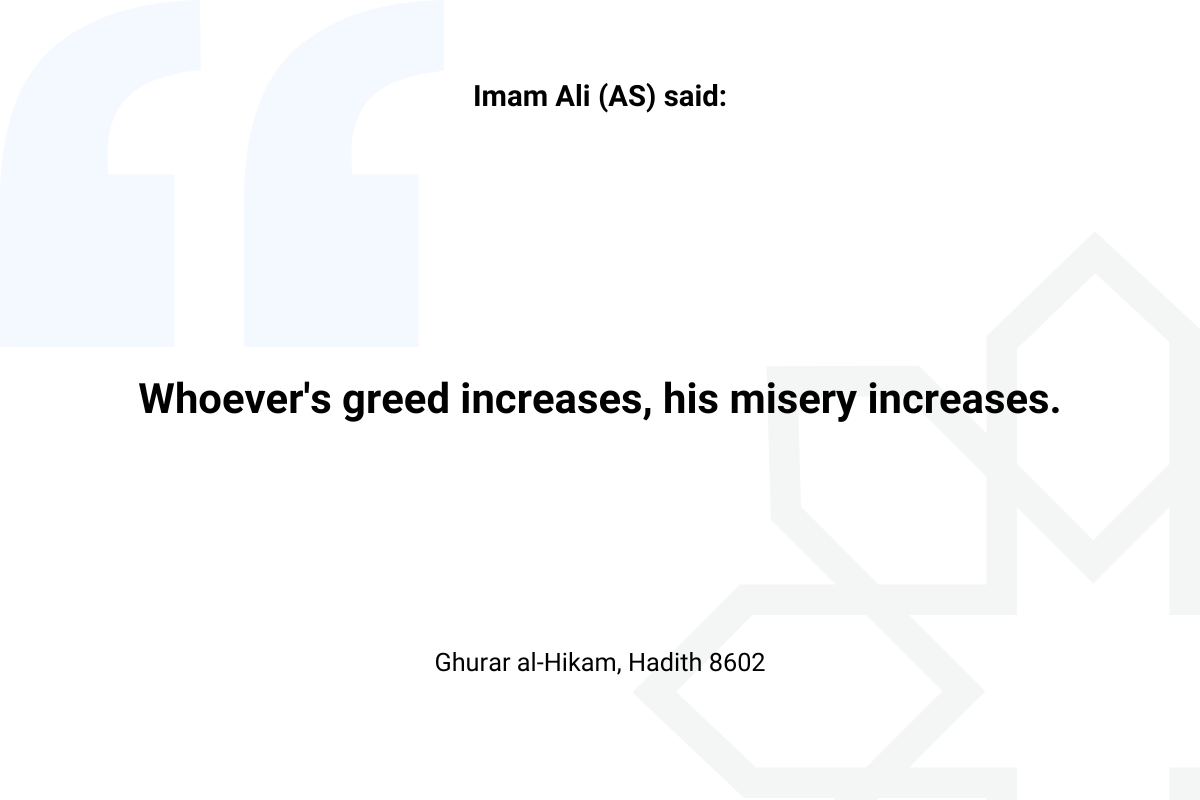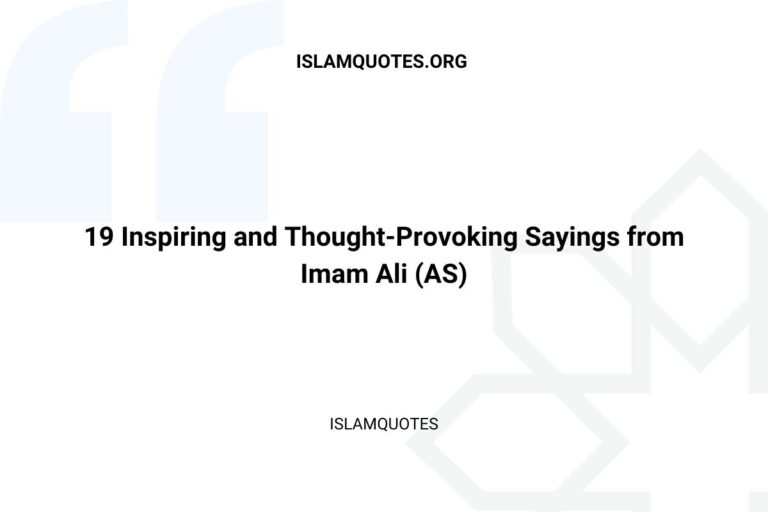Imam Ali (peace be upon him) said:
“Whoever’s greed increases, his misery increases.”
– Ghurar al-Hikam, Hadith 8602
Understanding the Relationship Between Greed and Misery
Analyzing the Quote in Depth
Imam Ali (AS) succinctly highlights a profound truth about human nature and the pitfalls of excessive desire. This quote from Ghurar al-Hikam serves as a reminder that unchecked greed inevitably leads to greater suffering and unhappiness.
The Pitfalls of Greed: A Closer Look
The Nature of Greed
The Insatiable Desire for More
Greed is characterized by an insatiable desire for more—more wealth, more power, more possessions. This unending quest often blinds individuals to what they already have, fostering a perpetual state of dissatisfaction. The allure of acquiring more creates a cycle where the attainment of one desire only sparks the pursuit of another, leading to a never-ending loop of want and discontent.
Psychological and Emotional Toll
The psychological impact of greed can be severe. It can lead to anxiety, stress, and a sense of perpetual inadequacy. When one’s sense of worth is tied to material possessions or achievements, the absence or loss of these can result in profound misery. Furthermore, the fear of losing what one has accumulated can create a constant state of worry and insecurity.
The Impact on Relationships and Society
Strained Personal Relationships
Greed often strains personal relationships. The pursuit of personal gain can overshadow the importance of nurturing connections with family, friends, and community. This can lead to isolation, resentment, and a breakdown in trust and mutual support. People driven by greed may prioritize their desires over the well-being of others, causing harm and fostering conflict.
Societal Consequences
On a broader scale, greed can have detrimental effects on society. It can exacerbate inequality, fuel corruption, and undermine social cohesion. When individuals or institutions prioritize their own interests over the common good, it can lead to exploitation, injustice, and social unrest. The pursuit of profit at the expense of ethical considerations can have far-reaching negative consequences for communities and the environment.
The Path to Contentment and Fulfillment
Embracing Moderation
To counteract the negative effects of greed, embracing moderation is crucial. This involves recognizing the value of what one already has and cultivating a sense of gratitude. By focusing on non-material aspects of life, such as relationships, personal growth, and spiritual well-being, individuals can find deeper and more lasting sources of fulfillment.
Cultivating Generosity
Generosity is a powerful antidote to greed. Acts of kindness and giving can foster a sense of connection, purpose, and satisfaction. By helping others and contributing to the common good, individuals can break free from the cycle of selfish desire and experience the joy of making a positive impact.
Seeking Spiritual Guidance
Islamic teachings provide valuable guidance on overcoming greed and finding contentment. The Quran and Hadith emphasize the importance of humility, gratitude, and trust in God’s provision. By aligning one’s desires with these principles, believers can develop a balanced approach to life that prioritizes spiritual and ethical values over material gain.
Practical Steps to Combat Greed
Implementing the Teachings of the Hadith
Daily Practices for Spiritual Growth
- Regular Reflection and Prayer: Engaging in regular reflection and prayer helps maintain a focus on spiritual values and reduces attachment to material desires.
- Practicing Gratitude: Keeping a gratitude journal or regularly expressing thanks for what one has can shift focus from what is lacking to what is abundant.
- Community Service: Participating in community service and charitable activities fosters a sense of purpose and connection, reducing the focus on personal gain.
Long-term Strategies for Personal Development
- Setting Balanced Goals: Setting goals that encompass personal, professional, and spiritual development can help maintain a balanced approach to life.
- Building Healthy Habits: Developing habits that prioritize well-being, such as regular exercise, healthy eating, and mindfulness practices, can reduce the tendency towards excessive desire.
- Seeking Mentorship: Having a mentor or spiritual advisor can provide guidance and support in navigating the challenges of greed and cultivating a fulfilling life.
Conclusion
Imam Ali’s wisdom in Ghurar al-Hikam offers timeless guidance on the dangers of greed and the path to true contentment. By understanding the nature of greed and actively working to cultivate gratitude, generosity, and spiritual growth, individuals can overcome the pitfalls of excessive desire and find lasting happiness.
For more insightful Islamic quotes, visit Islam Quotes.








